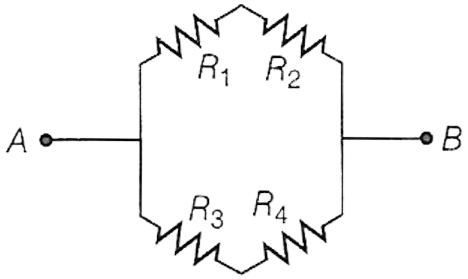Physics
Derive an expression for equivalent resistance in the following case

Decide, which resistances are in series and parallel. Solve for series and then for parallel. Combine both the results to get the equivalent resistance.
Current Electricity
7 Likes
Answer
In the circuit, there are three parts. In the first part, resistors of R1 and R2 Ω are connected in series. If the equivalent resistance of this part is R's then
R's = R1 + R2
In the second part, resistors of R3 and R4 are connected in series. If the equivalent resistance of this part is R''s then
R''s = R3 + R4
In the third part, the two parts of resistance R's and R''s are connected in parallel. If the equivalent resistance between points A and B is Rp then
p} = \dfrac{1}{R's} + \dfrac{1}{R''s} \\[0.5em] \dfrac{1}{Rp} = \dfrac{1}{R1 + R2} + \dfrac{1}{R3 + R4} \\[0.5em] \dfrac{1}{Rp} = \dfrac{R3 + R4 + R1 + R2}{(R1 + R2)(R3 + R4)} \\[0.5em] Rp = \dfrac{(R1 + R2)(R3 + R4)}{R1 + R2 + R3 + R4} \\[0.5em]
Hence, equivalent resistance = 1 + R2)(R3 + R4)}{R1 + R2 + R3 + R4}
Answered By
4 Likes
Related Questions
Draw ray diagrams showing the image formation by a convex lens when an object is placed
(a) between optical centre and focus of the lens.
(b) between focus and twice the focal length of the lens.
Complete the following nuclear changes.
(a) 11Na24 ⟶ X + -1β0
(b) 92U238 ⟶ 90Th234 + …………… + energy
A wire is dropped freely towards earth. Will any emf be induced across the ends of wire, if wire is initially in
(a) north-south direction?
(b) east-west direction?
(a) What is the angle of deviation?
(b) Copy the diagram given below and complete the path of the light ray till it emerges out of the prism. The critical angle of the glass is 42°. In your diagram, mark the angles wherever necessary.
